Items
topic_interest is exactly
gardening
-
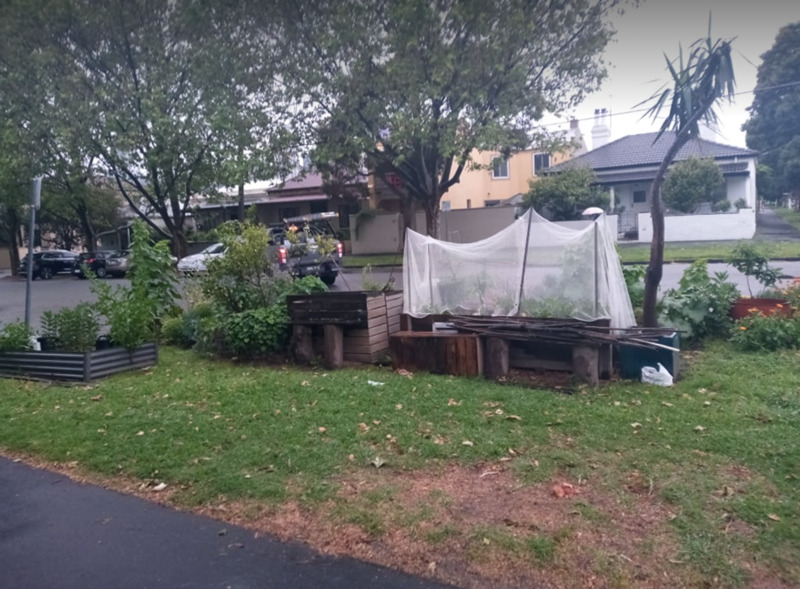 2021-10-07
2021-10-07Positives of the pandemic
This is a photo of a community garden at a park very close to me. Although this project existed before the pandemic, it has flourished much in this time to become a beautiful large garden with many different plants. I think this reflects some of the positive effects of the pandemic, as for some people, it gave them the chance to focus on things they might not normally have. Community engagement and connection in this way has provided hope for many people during this time. -
2020-03-21
Gardening During the Apocalypse
I can't think of the beginning of the COVID-19 pandemic, the shut downs and lock-ins, the stay-at-home orders without thinking of my brief foray into gardening. My husband and I bought our house in northwest Baltimore in April 2019. Our little duplex sits near the end of an unbelievably picturesque street in a fairly affluent neighborhood known for its garden communities and HOA-hosted wine and cheese parties you have to pay to attend. The neighborhood is surrounded by much poorer neighborhoods and heavily-trafficked streets, the direct product of red-lining in Old Baltimore. While the Original Northwood neighborhood is much more diverse - demographically and economically - than it was when it was first established in the 1930s and 1940s, my husband and I, as some of the only residents under 40, still felt like we didn't necessarily fit in with our older, more well-to-do neighbors, despite absolutely adoring our little home, which had been lovingly renovated and reimagined by its previous tenants. Come March 2020, however, the noise from the crowded streets, the surrounding neighborhoods, and from our own neighborhood, died down substantially. Our streets and its surrounds have always been a great place to go for a walk, but now every day people were strolling by in ones and twos, sometimes in small family units. Everyone needed to get out of the houses they were now cooped up in, and I was no exception. Much to my mother's chagrin - and likely to my neighbors' embarrassment - I did not inherent my mother's green thumb. Because I am a millennial I found an app that identifies plants and set about rooting out weeds, pruning the flowers the previous tenants had not intended for me to neglect, picking up the endless stream of leaves from our several 100+ year old trees, digging up more weeds and debating with my husband about whether we should start an herb and vegetable garden or put in a patio in the little garden area that connects our front and back yards. I did not become proficient at gardening. I am much better than I was, however, at identifying the truly astonishing diversity of plants in my own garden and in my neighborhood by scent and even touch. I learned that the dried and withered allium stalks pull effortlessly out of the ground after they die, that African violets also give way to a gentle scooping from the earth, and that thistle, of course, will still try to prick you as it attempts to cling to the soil. I learned that those thin but tough shoots of elm and oak born from the seeds and acorns the squirrels missed not only grow rapidly, but are extraordinarily difficult to rip from the earth. And no matter how much seemingly-delicate clover one claws at, its roots will always remain beneath the surface, as virulent in a day or two as when one earlier tore at it in complete dismay of its sheer stubbornness. I did not become proficient at gardening. But I did relish the feeling of cool, damp earth underneath my hands, even in my fingernails, the crunch of dry leaves, the slick sliding of wet leaves, the red, angry weals left on my hands from those stubborn oaks. I felt accomplished as I pulled lovely, but ultimately threatening African violets and wild raspberry from underneath the spreading cover of the hostas, and as I pulled wild mint, lemon, and rosemary for tea and cooking. I told myself I'd use the ramps (a species of wild onion that smells and tastes sort of of like a combination between garlic and scallions) in a soup, as a college roommate of mine had done, but I forgot to harvest them in time. From what I recall, summertime is best, particularly late summertime. The other thing I remember about this time spent in my garden, hands in the dirt, sweat on my brow, bug bites inflaming every available inch of skin, is the new sense of connection I felt with my neighbors who stopped to wave hello, nod and smile at my gardening efforts. Neighbors who I hadn't gotten to know before the pandemic which now prevented us, due to fear of contamination from contact with other people, from truly getting to know each other still. But somehow, the simple act of being out in my garden, doing this simple, repetitive toil, made me feel like I was participating in a ritual, an activity that linked me to the less unsavory past of the community, and to neighbors who otherwise might have remained alien in a plague environment that seemed to bring a new apocalypse with every week. -
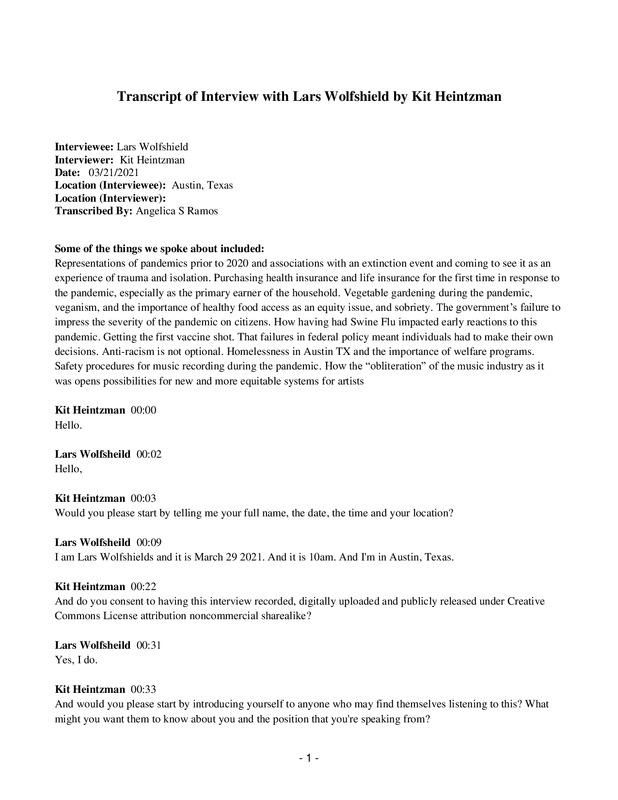 2021-03-29
2021-03-29Lars Wolfshield Oral History, 2021/03/21
Self-Description: “I am a pansexual and gender fluid artist and artist manager and I work primarily with Black and queer musicians and bands.” Record label: https://www.instagram.com/wolfshieldrecords/ -
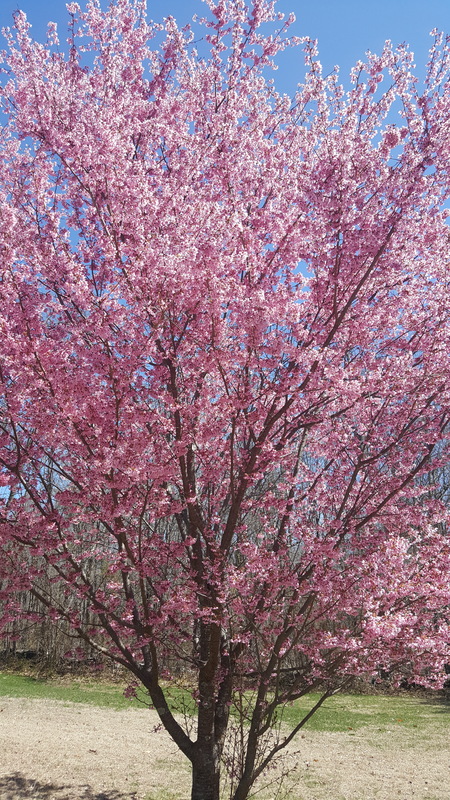 2020-06
2020-06Pandemic Gardening
While there were a lot of terrible things that happened as a result of Covid-19, I feel that one positive was humanity's return to nature. With so many places closed down, people were forced to go outside and enjoy forests, beaches, yards, etc. I was one of these people, and I discovered a talent for gardening. I enjoyed gardening before Covid-19, but the hobby really took off during the 2020 lockdowns. I grew potatoes, onions, flowers, herbs- anything that could be planted, I planted! -
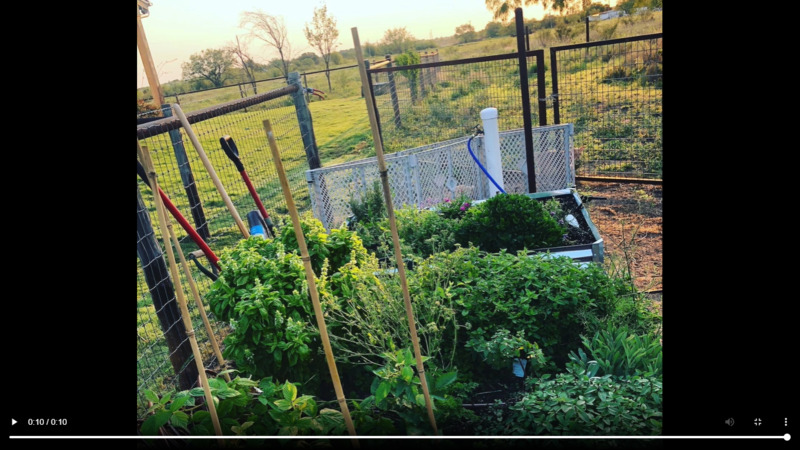 2021-08-06
2021-08-06Covid Gardening Story and Okra Recipe
I chose to focus on my garden and our chickens that we began right before the pandemic hit. I never realized how lucky I was to live in a rural environment until Spring 2020, when living in the country meant having a bit more freedom than in the city. Our garden and chickens provided us with foods that sometimes were out of stock in our small, local store. However, we also faced other things in our community that made the psychological aspects of the pandemic really hard, such as living with those who deny the reality of the disease and mitigation efforts that people like my husband promoted, as an ER physician. I suppose this story is a bit of a love letter to our little property out in the country, despite the differences in values that we have with our town. -
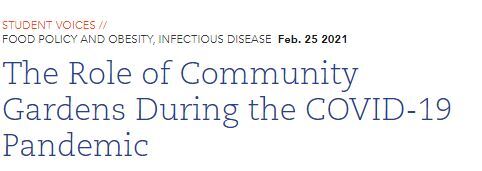 2021-02-25
2021-02-25The Role of Community Gardens During the COVID-19 Pandemic
The pandemic has brought the issues of food insecurity and the fragility of our food system to the forefront. This article discusses how household food insecurity disproportionately affects lower-income families and Black and Hispanic communities. Community gardens are one way to address these issues, providing mental health benefits, social and emotional support, and public health benefits during the pandemic. -
 2020-04-19
2020-04-19Home gardening blooms around the world during coronavirus lockdowns
Gardening and growing one's own food is a major trend resulting from the pandemic. In Russia, the U.S., Singapore, and Great Britain, people are turning to gardening to combat fears of food shortages and going to grocery stores and to provide a fun activity for adults and children who are working or attending school at home. -
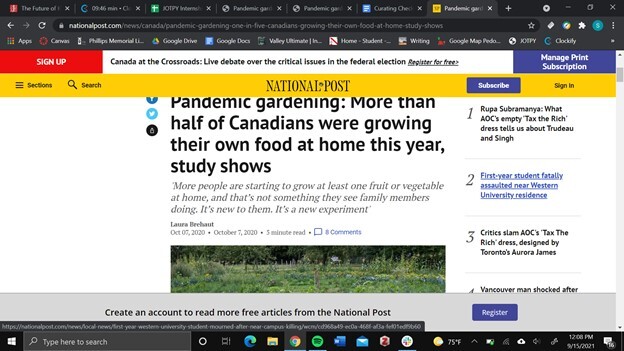 2020-10-07
2020-10-07Pandemic gardening: More than half of Canadians were growing their own food at home this year, study shows
Gardening and growing one's own food became more widespread during the pandemic, led by worries about food shortages and prices along with the desire to engage in new hobbies during the pandemic. This article discusses a study done by Dalhousie University regarding Canadians' growing their own food during the pandemic and compares the current gardening trend with the victory gardens prevalent during World War II. -
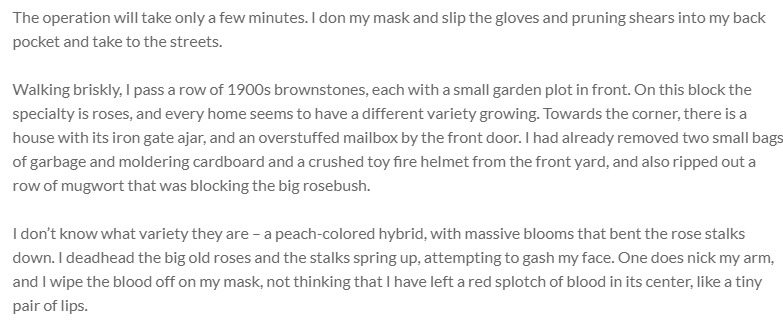 2020-06-04
2020-06-04Guerrilla Gardening in the Time of COVID-19
The operation will take only a few minutes. I don my mask and slip the gloves and pruning shears into my back pocket and take to the streets. Walking briskly, I pass a row of 1900s brownstones, each with a small garden plot in front. On this block the specialty is roses, and every home seems to have a different variety growing. Towards the corner, there is a house with its iron gate ajar, and an overstuffed mailbox by the front door. I had already removed two small bags of garbage and moldering cardboard and a crushed toy fire helmet from the front yard, and also ripped out a row of mugwort that was blocking the big rosebush. I don’t know what variety they are – a peach-colored hybrid, with massive blooms that bent the rose stalks down. I deadhead the big old roses and the stalks spring up, attempting to gash my face. One does nick my arm, and I wipe the blood off on my mask, not thinking that I have left a red splotch of blood in its center, like a tiny pair of lips. Pretty soon I have collected about thirty roses – all massive and past their prime and bring them home in a plastic bag I brought with me. I don’t think anyone would mind, and I am sure the person who planted these roses doesn’t mind. A hybrid rose plant like this needs a lot of tending, but the blooms are enormous. As part of my quarantine routine, I take walks in the early morning. After a while, I got tired of seeing weeds hiding the “nice” plants and began reflexively pulling them. It was fun! Especially after a rainfall, when the weeds pulled out so effortlessly. After a few minutes work I would have a sheaf of shepherd’s purse, lambsquarter and mugwort under my arm. Fortunately, there is always an empty construction yard in our rapidly developing neighborhood, and that’s where most of my weeding crop ends up, lobbed over the green construction fence. Nobody has ever bothered me, except for the times older women will ask if I eat the weeds. Since the trees planted by the city have little tags on them that give tips on how to take care of them, including one that instructs citizens to keep the tree pits free of weeds, I consider that my carte blanche. “I work for Bette Midler!” I want to tell somebody, but nobody asks. Some houses show evidence that they were owned by gardeners that took a lot of pride in their plants but abandoned them this year. I see mugwort and lambsquarter cropping up in beds of well-tended plants –gardens that might have received some care earlier in the season but, for some reason, have been untouched these past few months. I reach over and – yank –problem solved. I know they would do it, if they were able. One home I pass by regularly had an infestation of mugwort that covered some nice lilies and other shrubs. After a few days I had cleared all the mugwort out, and stopped by every so often to rip the tiny mugwort sprouts that persisted – some of the roots are tough, baseball-sized clumps that live for years, and you often find odd things wound up in them like bottle caps and corks. This past week, our local news had the notice of the death a Haitian doctor in our neighborhood of longstanding repute, who had died of COVID-19. For the obituary, they showed not a photo of the man, but of his doctor’s office, which was the old house where I had been waging my war against mugwort. So many have died in our neighborhood – so many gentle people who once sunned themselves in front of their houses and apartment buildings and maintained the cheery tradition of saying hello to all neighbors. When they moved here, Flatbush was cheap, and a family from Trinidad or Guyana could buy decent homes for an affordable price, in what was then a highly unfashionable neighborhood. The untended gardens of my older neighbors are hard to miss, when you know what to look for. “Maybe they just went out of state, you don’t know,” say my kids, when I showed them the peach-colored rose bush I had been surreptitiously tending. They were horrified, and nervous that I was breaking a law. My daughter even closed and latched the small iron gate, while sternly looking at me, warning that I could get arrested, or worse. But I’ll be back. Those roses need me. -
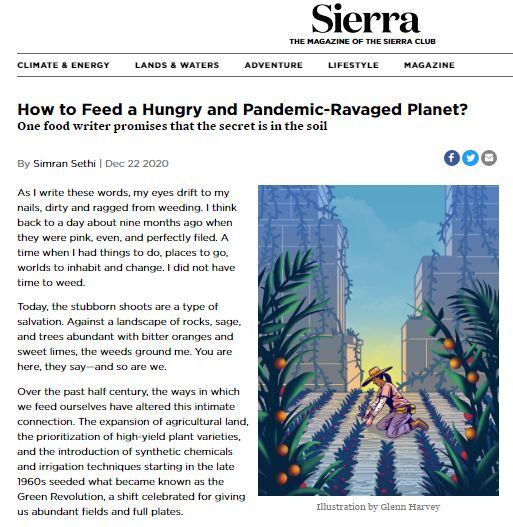 2021-04-18
2021-04-18Gardening: Feeding the Planet and Ourselves
Gardening is something I learned I loved in the spring of 2019, and I noticed many differences during the pandemic. The garden centers were always busy, much busier than the year before. And often, they would be sold out of things such as vegetables. The article I have shared here I found while researching food insecurity. I have long thought that growing your own food is something that should be more widespread, especially among places of poverty. Of course, this article does not mention the fact that people living in extreme poverty barely have enough water to survive, let alone grow crops with. Regardless, this article makes good points about our soil, our diets, and the future of our planet and species. I think one good consequence of the pandemic is more people will turn to gardening, which opens up many more aspects of life. -
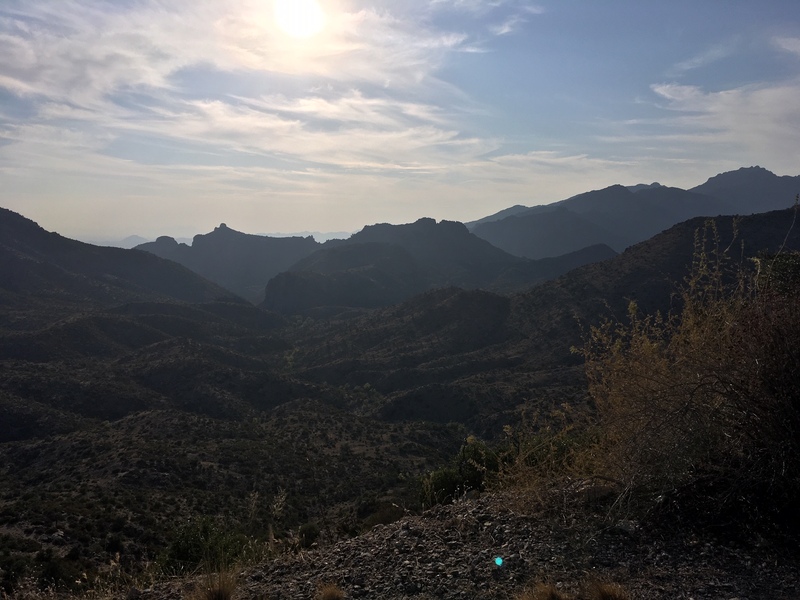 2021-02-16
2021-02-16Desert Mountains in Late Afternoon, Tucson, Arizona, USA
This photograph of desert mountains in Tucson, Arizona, USA, shows the beauty and the power of nature. The image is associated with our creation of an Environment collection in the archive. We seek to collect stories about the environment: how it has been impacted by the pandemic, with changes in pollution levels, increased levels of trash, and alterations in human interactions, and how humans have interacted with the environment during the pandemic, using it decrease stress, get out of the house, grow food, and gain a greater knowledge and appreciation of it. -
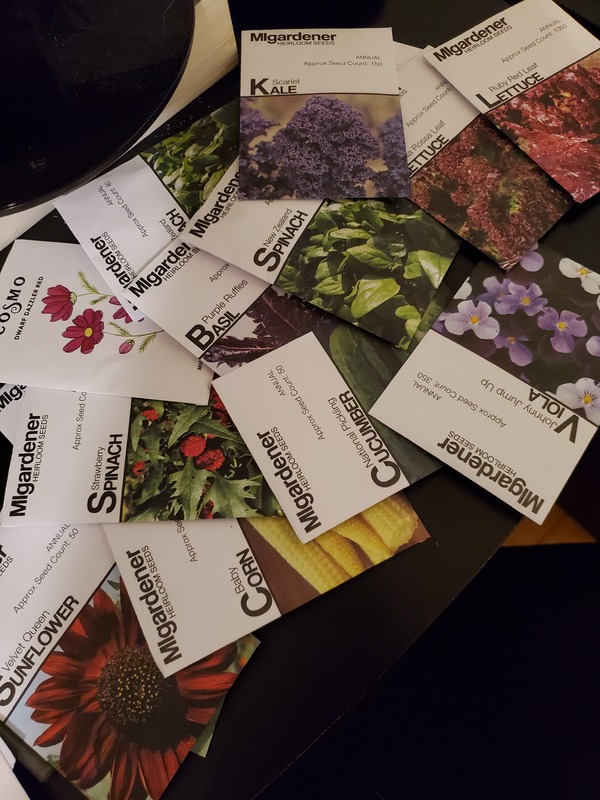 2021-01-31
2021-01-31COVID-19 Gardening in 2021
The gardening industry saw a jump in the number of home gardeners in 2020 unlike ever seen before. People, with time on their hands and nowhere to go, jumped into the home gardening world. As a home gardener myself, I think that this is a great thing. I have been trying to convince friends of mine for many years now how easy and enjoyable growing some of your own food is. During Covid, many people picked up the hobby. I hope that people stick with it as there are so many benefits. However, I saw last year what panic buying and the uptick in home gardeners did to the industry. At times, it was nearly impossible to find seeds or gardening supplies. For this reason, I have already purchased all of the seeds that I will be using in my garden (a full 2 months before I would have normally even thought about buying them). The photograph is of a couple of the new seeds and varieties that I can't wait to start in the Spring. -
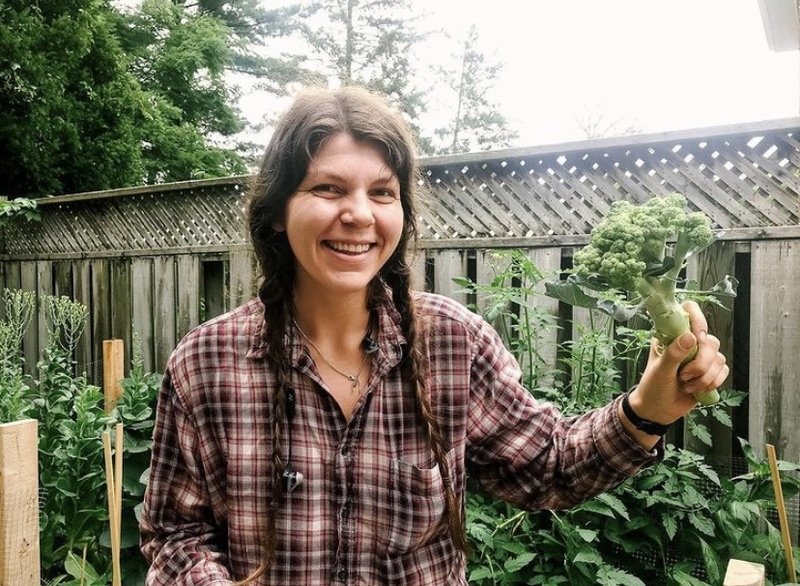 2020-08-06
2020-08-06Getting really excited that I'm actually growing edible food in the garden!
This post about a Canadian nutritionist reveals an individual's experience gardening this past summer during the pandemic. The caption includes how this person picked up gardening as a new hobby during lockdown and found how rewarding it was. This post will serve as a valuable story in how gardening became a popular activity for Canadians and offer one person's journey, including challenges, in starting a garden. -
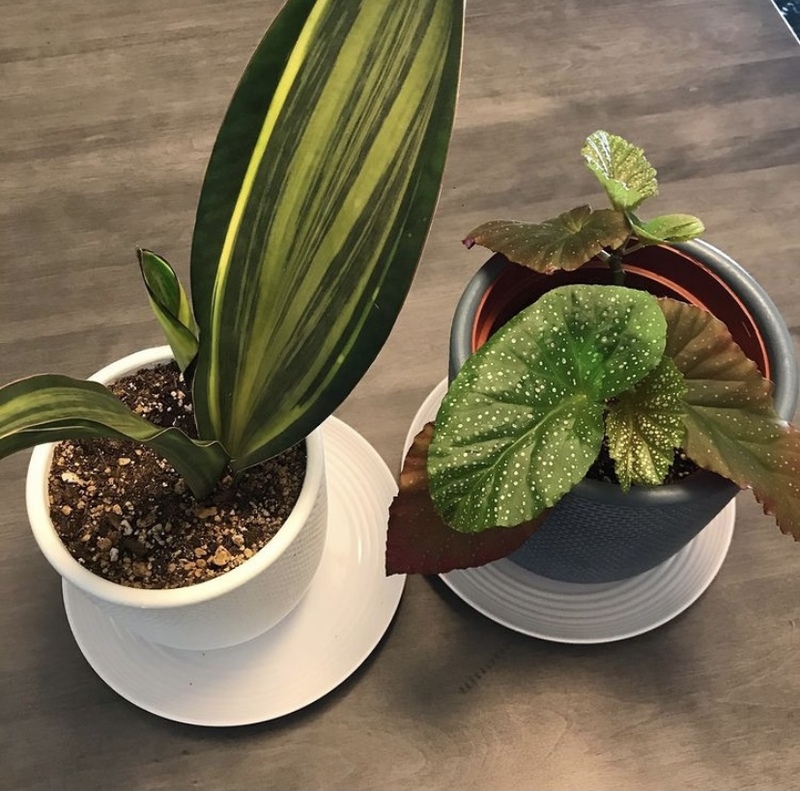 2020-11-25
2020-11-25New Covid restrictions announced today in Edmonton, Alberta, Canada
This photo includes two plants, and the caption describe the new restrictions enforced for Albertan residents. This post offers an individual view into how Canadians, particularly city dwellers, grew plants in the midst of COVID-19. -
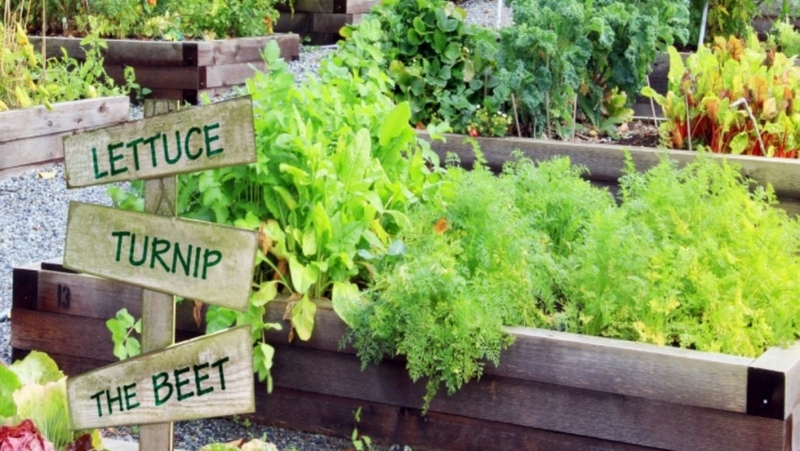 2020-10-08
2020-10-08Over half of Canadians embracing the joy of pandemic gardening
One study from Dalhousie University reported that "pandemic gardens" became a thing this past summer as thousands of Canadians across the country spent more time outside growing their own food. This article also reveals the reasoning behind why people took to gardening as one of their main sources of entertainment during lockdown and even afterwards. The study shows that Canadians gardened for a multitude of purposes. Not only did they want to spend more time outside, but some were also concerned about food affordability due to the shortage of produce. This article will further illuminate how Canadians viewed gardening as one of their favourite pastimes during COVID-19 through an informative survey. -
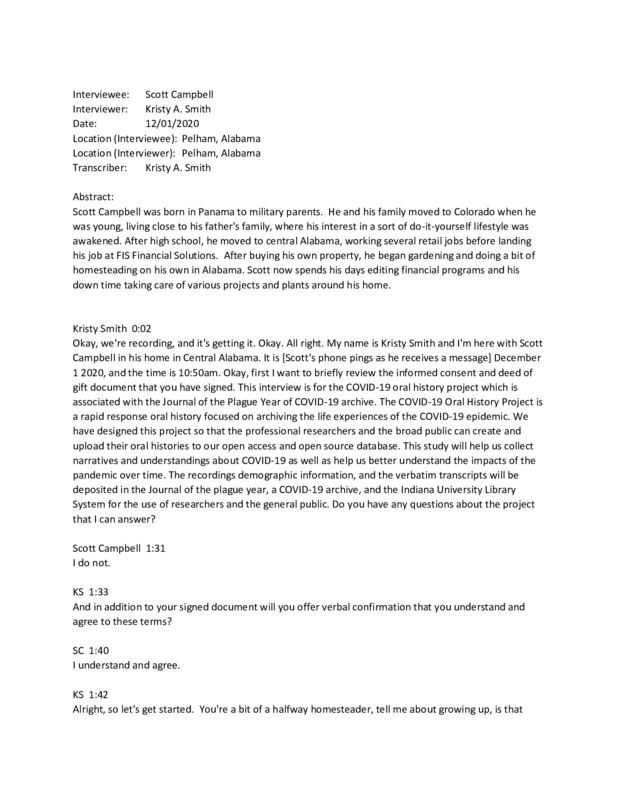 12/01/2020
12/01/2020Scott Campbell Oral History, 2020/12/01
Scott Campbell was born in Panama to military parents. He and his family moved to Colorado when he was young, living close to his father's family, where his interest in a sort of do-it-yourself lifestyle was awakened. After high school, he moved to central Alabama, working several retail jobs before landing his job at FIS Financial Solutions. After buying his own property, he began gardening and doing a bit of homesteading on his own in Alabama. Scott now spends his days editing financial programs and his down time taking care of various projects and plants around his home. -
0020-10-16
Revitalizing Cultural Gardening
When the stay at home order hit, I was in a tailspin wondering what to do at home. I couldn’t imagine working from home and teaching my children might last from March to September. Something amazing happened. For over ten years, I talked and dreamed of gardening. I recalled my grandmother gardening when I was a child. She taught all of her grandchildren her indigenous knowledge of growing food from the land. Working from home and homeschooling during the day, allowed us to take breaks and walk to our yard for gardening. The location of our garden in relation to home, work, and school was very convenient. Gardening allowed me to learn the different smells of dirt. The clay and muddy kind of dirt needed to be mixed with finer sand, manure and topsoil. The soil on my land was not sufficient for growing the plants I wanted. We worked early in the morning until the heat became too much to bear. Then we returned in the evening as the sun disappeared from the horizon. Our work included turning the soil, hauling in bags of manure and topsoil, and transporting finer dirt from areas around our home. Once the dirt and seeds were ready, the watering began. I never believed water smells different at different times of the day and months. In the morning, the cool crisp water smells light and pure. During the hotter times of the day, the water smells musky and not as refreshing. It led me to wake up early in the morning and come out late in the evening to water my plants. The smell of the damp earth will forever remind me of the journey of revitalizing cultural gardening techniques taught by my grandmother. -
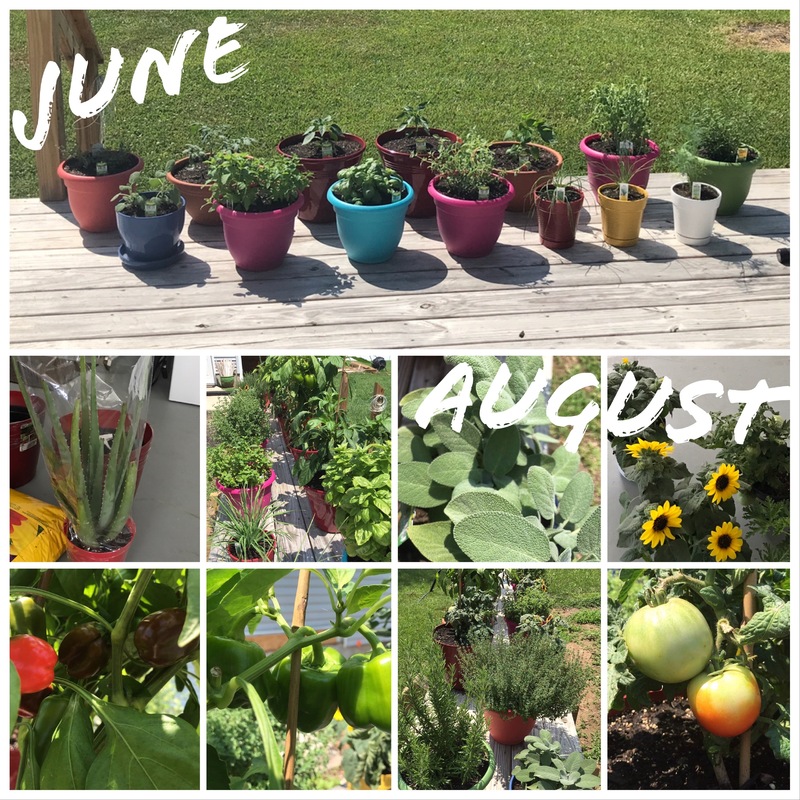 2020-08-10
2020-08-10Growth, Gratitude, and Green Babies
Teddy Roosevelt said, "The more you know about the past, the better prepared you are for the future." As the pandemic and panic seemed to spread wildly across the globe, I found myself turning to my relatives for answers and advice. When specifically in their lifetime did they remember a time of uncertainty? What did they do to maintain a sense of direction, clarity to make decisions, a sense of well being and safety when each day's events are unfathomable? My mother responded with stories of her mother. My grandmother has always been the most resourceful person I know. Growing up in the Great Depression planted seeds of ingenuity and self sufficiency in her, which she continued to cultivate along with priceless experience and knowledge. She recalled people taking responsibility for their situations and security, and doing their best to make the most of what they had, which at the time wasn't much at all. I will never understand the scarcity she faced in that era, but I did experience the eerie alarm that washed over my fiancé and I entering a nearly empty produce section of our local grocery store, then another store, then another store. Almost every store in our small town of Lewes, Delaware had been almost completely panic-bought out of produce, meat, cleaning products, and hygiene products. It was at that time we decided to take a life lesson from Grandma, gain some grit, and get our hands dirty. Early June, we began a basic herb garden to get the hang of being "new parents to green babies" as we expressed it to our friends and family. We soon adopted a couple of tomato plants, bell peppers, red lunchbox sweet peppers, and as of recently, sunflowers. August brought our efforts to fruition when tiny peppers and tomatoes started to develop and today we plucked our first ready to eat hamburger tomato along with a few green bell peppers and scarlet red sweet peppers. Tending our garden has grown more than just invigorating herbs and veggies, but it has cultivated therapeutic peacefulness and tranquility while watering, cleaning, and caring for these little forms of life. We learned first hand the valuable lesson of just how giving and selfless nature is, ex. planting one seed and getting three pieces of fruit in return from that one plant, or planting one bulb which springs forth four blossoms. Giving life and helping maintain that life in something smaller than you grows a beautiful relationship between humanity and nature, a relationship which has become more and more distant. Growing a garden reconnected us to the knowledge, innovation, and self reliance, of our grandparents. It reconnected us to getting outdoors, getting our hands dirty, and getting into a flow state of mental clarity and caring for another living being apart from human kind. It reconnected us to nature, to the valuable lesson Mother Nature can teach us about selflessly giving and sharing, and a reminder of the respect she so deserves and is so lacking in the current state of the environment. I hope our story of our little backyard garden will encourage you to plant seeds of your own, to look to the priceless knowledge and experience of your relatives for advice in facing an uncertain future, and to share your lessons and stories of how COVID-19 impacted your life as well. -
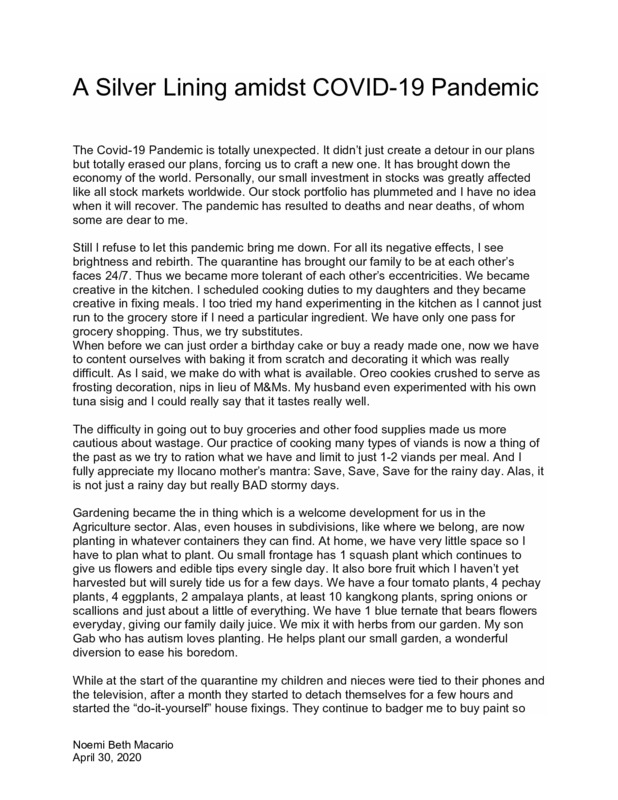 2020-04-30
2020-04-30A Silver Lining amidst COVID-19 Pandemic
I always look for the good despite the bleakness of what is happening.
